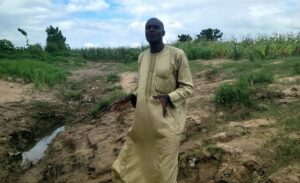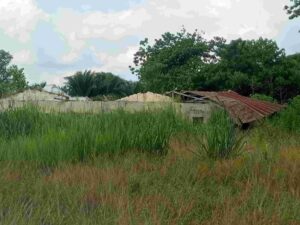Infant deaths and miscarriages have become a repeated experience for some women in Pmalogo and Dnakulu communities in Shere Ward of the Bwari Area Council of Nigeria’s Federal Capital Territory (FCT), Abuja as the communities are grappling with a harsh reality – they lack healthcare facilities. And because of the poor roads, residents—especially laboring pregnant women—are put in danger during emergencies when they must travel longer distances to receive healthcare in neighboring areas.
The dire situation contrasts with the huge budgets allocated to Bwari Area Council, reaching over 30 billion naira in the last four years. Despite these funds, these communities remain neglected. The council’s chairman, John Gabaya, who pledged inclusive growth and development, seems to have overlooked Pmalogo and Dnakulu. Safer-Media Initiative, SMI reports how this neglect is taking a toll on the lives of the residents.
The journey to Pmalogo and Dnakulu reveals a challenging terrain. For nearly two hours, this reporter rode on a commercial motorcycle from Mpape to the Pmalogo and Dnaku communities. Mpape is relatively the most developed settlement nearest to these communities, and it’s located within a twenty-kilometer radius of Aso Rock, the official residence of Nigeria’s president.
The reporter navigated through a narrow, rough, desolate, and eerie road with pockets of rivers and muddy and slippery paths to walk through. The shrubs, thick vegetation, and towering hills on both sides of the road were enough to inspire fear and give a first-time visitor an impression of danger. 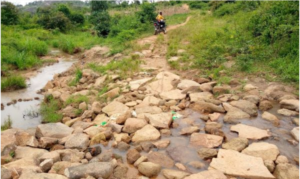
The road that leads to the communities
After an exhausting journey, the first community sighted was Dnakulu, which was a short distance away from Pmalogo.
It was on a rainy Thursday in October, the day Safer-Media Initiative (SMI) visited the two communities. The locals, who are mostly farmers, left their farms and came to share their concerns with the SMI reporter. Gathered in an open space, they sat in groups of men and the male youths on one side, while the women and the girls were on the other side.
They took turns to speak.
40-year-old Elizabeth Daniel, a mother of three, was the first to speak. Tragically, Elizabeth’s experiences echo the stories of other women in the community, with preventable deaths occurring due to the lack of timely medical attention.
She tearfully recounted losing four pregnancies in a space of nine years due to the arduous journey to Shere, where the nearest health center is located.
“I gave birth to seven children, but only three are alive,” she narrated.
Elizabeth had lost the first pregnancy in 2014.
She told SMI: “I trekked from here to Shere. When I got to the hospital, the doctor said that the baby was weak and that I was tired too. He told me that the baby would not come out alive, and he was right. I didn’t return with the baby.”
The commute time between Pmalogo and Shere – where a Primary Health Care Center is sited – is a 35 minutes ride on a motorcycle, and about two hours on foot.
There is also a healthcare center at Galuwyi, a neighboring community of about one and a half hours walkable distance and twenty-five minutes ride on a motorcycle.
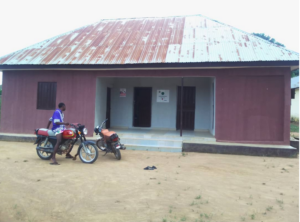 The Galuwi Healthcare Facility
The Galuwi Healthcare Facility
SMI learned that the Galuwyi Healthcare Facility has been operating in a two-room dilapidated building for years until it was renovated recently . Some residents told our reporter that services in the center have improved more than they have for years.
However, because of the bad road, going to Galuwyi for medical attention can be difficult. As a result, most people from Pmalogo are unable to access medical services at Guluwyi, including pregnant women who need antenatal care.
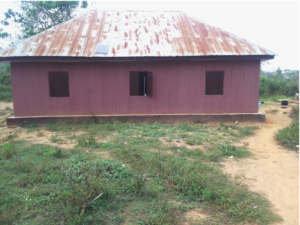 Back view of the Healthcare Facility
Back view of the Healthcare Facility
Elizabeth continued to recount her experiences with the other pregnancies. She told SMI how she was lucky with her second pregnancy in 2016; the child was delivered safely, but it was not the case with the third and fourth pregnancies. The third child, born prematurely, died immediately after birth, while the fourth became sick and passed away a few months later.
She believed that her child’s demise resulted from a failure to provide prompt medical attention.
She said: “My husband was on the farm when it started. I had to send some people to go and fetch him. We trekked to Galuwyi, where we were told to take him to the health center in Shere. By the time we got to Shere, he was pronounced dead.”
More woes
Mary David, another woman in the community, had similar experiences as Elizabeth.
Mary narrated: “I have birthed eight children, but only two are alive today. Of all my pregnancies, only one stayed for nine months. I was told not to do heavy work, but even the trekking to the hospital was tedious work.
“When we get to an area where the bike cannot pass, we come down and trek. Sometimes, we push the bike until we get to a place where the bike can run smoothly, then we continue the journey.”
For years, the community had no means of transportation connecting it to other communities. This was the case until recently, when two members of the community bought motorcycles.
But the residents said riding a motorcycle through the rough terrain isn’t an easy task, especially when carrying a passenger, and it’s even worse when it’s a pregnant woman in labor.
David Samuel is the community’s secretary. He told SMI how his brother’s wife passed away during childbirth the previous year.
He narrated: “We took her on a bike through the rough road to the health center at Galuwyi around 6 p.m. By morning the next day, she was still battling to give birth. I had to quickly get a vehicle to rush her to Bwari General Hospital. Before we got there, she became very weak. We lost her eventually.”
David is not happy. He noted that many deaths may have been prevented if people had received healthcare sooner. Speaking further, he described a scenario in which, in the absence of a motorcycle, a woman would have to carry her child on her back and walk several hours to the health center.
Dnakulu faces similar challenges
While the Pmalogo community now enjoys potable drinking water, that cannot be said of the Dnakulu community. Just like Pmalogo, a philanthropist (only known as a Yoruba man) drilled a borehole for them. But since last year, the water source has packed up, leaving the residents with no choice but to return to the stream for water.
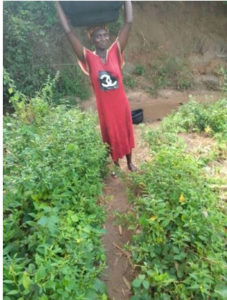 A resident fetches water from the stream
A resident fetches water from the stream
Samuel Adamu, a native of the community, said requests for assistance to repair the borehole have been met with silence, adding that even after the initial inspection of the community by the council two months ago, there had not been any follow-up action by the government.
A student of Political Science at the Federal University, Gashua, Yobe State, Adamu (as he preferred to be mentioned), who is also a resident of the community, accused the government of only approaching them whenever there were elections but that the government’s promises during elections seem to vanish afterward, leaving the community in dire straits.
Health Expert Speaks
A consultant public health specialist, Prof. Chima Onoka, who is a professor in the health systems, policy and management unit of the Department of Community Medicine, College of Medicine, University of Nigeria, highlighted that the underlying health issues leading to miscarriages might have been detected with proper healthcare. However, the communities’ remote locations make it difficult for residents to access timely medical attention.
Onoka suggested that health posts can be set up for communities such as Pmalogo and Dnakulu where there are no primary health care facilities within 30 minutes’ walking distance from the area.
Nigeria records 576 maternal deaths per 100,000 live births, while approximately 262,000 babies die at birth every year, according to the United Nations Children’s Fund (UNICEF).
The report titled “Situation of Women and Children in Nigeria” also stated that infant mortality stands at 69 per 1,000 live births, while under-five deaths are 128 per 1,000 live births, with more than 64 percent of the deaths caused by pneumonia, malaria, and diarrhea.
Nigeria’s former minister of health, Osagie Ehanire, affirmed that the lack of access to healthcare is the main contributory factor to high maternal, infant, and under-five mortality in the country.
However, governments seem not to have done much to help the situation. According to the Nigerian Constitution of 1999, the provision of healthcare at the primary healthcare level is largely the responsibility of local governments with the support of state ministries of health and under the overall national health policy.
The local governments are to budget, implement, manage, monitor, and evaluate primary health care within the local area.
Bwari’s budget failed to provide succor
In the last four years, the Bwari area council has budgeted over 30 billion naira for current and capital expenditures. Despite the huge budget, these communities have been seemingly neglected and abandoned.
In 2020, the Chairman of the Bwari Area Council, Mr. John Gabaya, presented a budget proposal of over six billion naira (N6,056,024,123) before the members of the council’s legislative arm.
In 2021, an appropriation bill totaling N6.6 billion was presented by the chairman.
Gabaya, while presenting the proposal, pegged N3.4 billion on capital expenditure.
The council’s 2021 proposed appropriation estimate also had over 1 billion naira (N1, 128, 901, 718) for health and human services.
In 2022, Gabaya presented a budget proposal of N8 billion before the members of the council.
In the proposal, over N4.6 billion was earmarked for total capital expenditure.
The council’s 2022 appropriation bill proposed a total sum of N1 billion for health and human services and N590 million for education and social development.
This year, 2023, the Chairman presented a budget of over ten billion naira (N10,684,556,784) christened a budget of ‘Inclusive Growth and Development’ yet, two communities were not included in the planned growth and development.
Gabaya, who was first elected as chairman of Bwari Area Council in 2019, was re-elected to the office in 2022. After he was elected in 2019, the chairman pledged to ensure that the necessary amenities are provided, irrespective of ethnicity, religion, and party affiliation.
During his second tenure, he also promised to fix deplorable township roads, improve education, and provide quality healthcare for rural dwellers. But these promises have not reached the people of Dnakulu and Pmalogor.
‘We have been neglected and forgotten’
The secretary to the Pmalogo community, David, said since the inception of the council, the communities have not experienced any dividends of democracy, even after many pleas to the council.
The 47-year-old farmer narrated to SMI how the area council had sent a delegate to communities three years ago, requesting them to write down their challenges, but after the community had listed out its needs as clinics, roads, and primary schools, none of their concerns had been addressed by the council.
The community’s challenge, according to him, is even more complex due to the fact that it is not on the map of the council.
“We were sharing a name, “Dnaboyi,” with another community that migrated to another area from here. This happened many years ago, even before I was born. The community insisted that the name ‘Dnaboyi’ was theirs and that we should bear another name. That was how we started bearing Pmalogor. I have been regularly visiting the council to ensure that this name is included in the council’s map, but I’ve not yet succeeded,” he said.
Water Challenge
“You see the water here,” he said, pointing at an overhead water tank in the community. “It was the Catholic Church that gave it to us. Before then, we had pleaded with the council for years but got no answer.”
SMI gathered that the borehole was constructed in 2021 by the Catholic Archdiocese of Abuja, through the former parish priest overseeing the area, Fr. Louis Duniya. The priest, in an interview, explained that the church decided to help the community after seeing what they pass through to get water. He noted that it had also assisted three other communities in the area.
David added that before the ‘Catholic Church-assisted water project,’ a non-governmental organisation had wanted to drill a borehole in the community but that the contractor complained about the inaccessibility of the road to the community, and that that was how they lost the chance.
Before the borehole was drilled, the people had to rely on streams for water. While they still visit the stream to take their bath and wash their clothes, the water from the borehole is now reserved for drinking and cooking due to the high cost of fuel for the pumping machine.
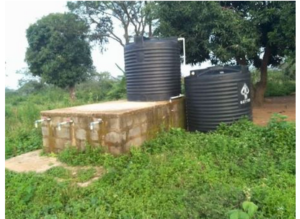 The borehole built and donated by a philanthropist
The borehole built and donated by a philanthropist
A need for a primary school
The two communities also expressed concern over the far distance of the only primary school in that whole area, which is situated in Galuwyi, adding that they fear for the safety of their children whenever they head to school.
“Because of the distance, many of our children don’t go to school. The priest that helped us with the water project also gave us three bundles of zinc to build a small class for the children, but there is no one to teach them. I do my best to teach them whenever I come back from the farm,” explained Samuel, who had only finished primary school.
Civil Society Organisation speaks
As the communities grapple with these hardships, civil society organizations and residents are calling on the government to act swiftly.
Speaking in a phone interview with SMI, the Communication Officer, HipCity Innovation Center, Progress Ajanaku, lamented that many indigenous communities in the FCT are going through the same challenges, especially as it pertains to access to healthcare.
Ajanaku, whose organization had visited the 17 chiefdoms of the FCT, urged the area councils to work with the National Primary Health Care Center to ensure that more structures are built and the dilapidated, renovated, and upgraded.
On the need for more staff at the centers, Ajanaku urged the government to fully implement the Basic Health Care Provision Fund (BHCPF) to support pregnant women and children in the area.
The BHCPF is derived from an annual grant from the Federal Government of Nigeria of not less than one percent (1%) of the Consolidated Revenue Fund (CRF); grants by international donor partners; and funds from any other source, inclusive of the private sector.
The cry for attention from these marginalized communities echoes the broader challenges faced by indigenous communities in the FCT, emphasizing the urgent need for action and accountability.
Councilor denied the community
The councilor of Shere Ward, Hon. Ali Tuzambo, denied knowing anything about the communities. The councilor spoke with SMI’s reporter on the phone. This was after he had turned down all scheduled interviews with him.
SMI also sought to see the Council Chairman, but attempts to book an appointment with him through his Chief of Staff, Sunday Zaka, and Chief Press Secretary, Agada Samuel Ernest, were unsuccessful.
This report is produced by Safer-Media Initiative under The Collaborative Media Engagement for Development, Inclusivity and Accountability Project (C-MEDIA Project) of the Wole Soyinka Centre for Investigative Journalism (WSCIJ) funded by the MacArthur Foundation.


